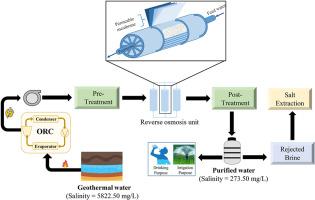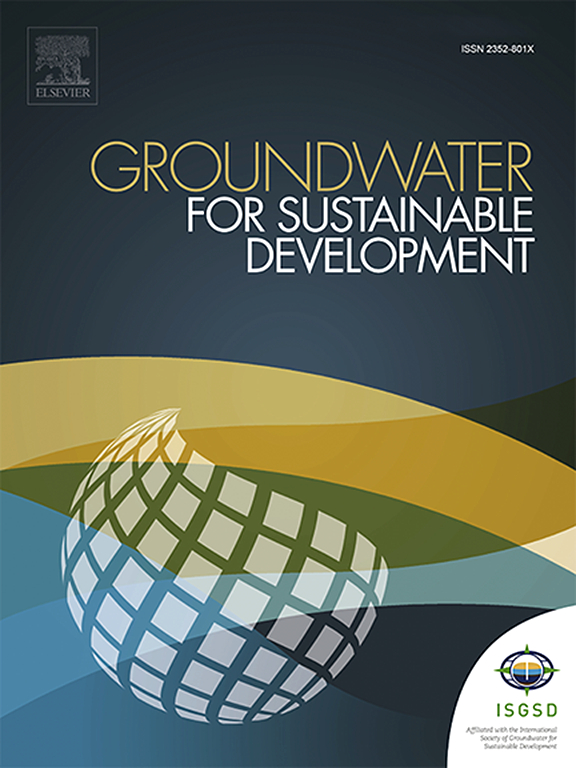地热辅助先进的高盐度海水淡化技术:从技术开发到季节性影响优化
IF 4.9
Q2 ENGINEERING, ENVIRONMENTAL
引用次数: 0
摘要
获得清洁饮用水是全球的当务之急,尤其是在缺水地区。本研究旨在探索一种可持续的方法,通过淡化从古吉拉特邦 Dholera 一个地热热点提取的地热水来提高水质。由于该地区缺少清洁的饮用水,因此最好采用有机秩循环(ORC)驱动的合适方法对这种可再生资源进行处理,然后将其用于饮用和灌溉目的,这不仅符合可持续发展的目标,而且对环境的影响也最小。调查说明了地热辅助海水淡化装置的制造和演示,以及在研究地区建立的用于高盐度水定性淡化的工厂。在地热水淡化前后,对该系统的性能进行了季节性变化评估。结果表明,污染物明显减少,盐度降低了 95.30%,总溶解固体(TDS)降低了 96.91%。这种方法的新颖之处在于从废水的副产品中提取盐分,有助于资源回收。这种方法是解决该地区缺水问题的一种环境友好型可持续解决方案,符合可持续发展目标(SDGs)。强大的 p 值(均为 0.001)表明了该流程的实施效果。此外,所有参数的 Cohen's d 值都很高,这表明海水淡化在灌溉和安全饮用等实际用途方面具有很强的效果。本文章由计算机程序翻译,如有差异,请以英文原文为准。

Geothermal aided advanced desalination of highly saline water: From technology development to seasonal impact optimization
Access to clean drinking water is a critical global imperative, particularly in regions facing water scarcity. The present study aims to explore a sustainable approach for enhancing water quality by desalinating geothermal water which is extracted from a geothermal hotspot at Dholera, Gujarat. Since there is a shortage of clean and potable water in the area, it is advisable to use this renewable resource for drinking and irrigation purpose after treatment through a suitable method powered by organic rankine cycle (ORC) which not only serves the aim of sustainable approach but also has minimum environmental impact. The investigation illustrates fabrication and demonstration of geothermal-aided desalination unit and its plant set up at the study area for qualitative desalination of highly saline water. The system's performance is evaluated for seasonal variations in geothermal water, both before and after desalination. Results shows a significant reduction in contaminants, with decrease in salinity by 95.30% and total dissolved solids (TDS) by 96.91%. The novelty of this approach lies in salt extraction from the by-product of rejected water, contributing to resource recovery. This approach demonstrates an environmentally friendly and sustainable solution to address water scarcity in the region which is aligned with sustainable development goals (SDGs). The process's effectiveness for implementation is suggested by the strong p-values (all <0.001). Additionally, the Cohen's d values, which are noticeably high across all parameters, indicate strong effect sizes ensuring desalination's viability for practical uses such as irrigation and safe drinking.
求助全文
通过发布文献求助,成功后即可免费获取论文全文。
去求助
来源期刊

Groundwater for Sustainable Development
Social Sciences-Geography, Planning and Development
CiteScore
11.50
自引率
10.20%
发文量
152
期刊介绍:
Groundwater for Sustainable Development is directed to different stakeholders and professionals, including government and non-governmental organizations, international funding agencies, universities, public water institutions, public health and other public/private sector professionals, and other relevant institutions. It is aimed at professionals, academics and students in the fields of disciplines such as: groundwater and its connection to surface hydrology and environment, soil sciences, engineering, ecology, microbiology, atmospheric sciences, analytical chemistry, hydro-engineering, water technology, environmental ethics, economics, public health, policy, as well as social sciences, legal disciplines, or any other area connected with water issues. The objectives of this journal are to facilitate: • The improvement of effective and sustainable management of water resources across the globe. • The improvement of human access to groundwater resources in adequate quantity and good quality. • The meeting of the increasing demand for drinking and irrigation water needed for food security to contribute to a social and economically sound human development. • The creation of a global inter- and multidisciplinary platform and forum to improve our understanding of groundwater resources and to advocate their effective and sustainable management and protection against contamination. • Interdisciplinary information exchange and to stimulate scientific research in the fields of groundwater related sciences and social and health sciences required to achieve the United Nations Millennium Development Goals for sustainable development.
 求助内容:
求助内容: 应助结果提醒方式:
应助结果提醒方式:


